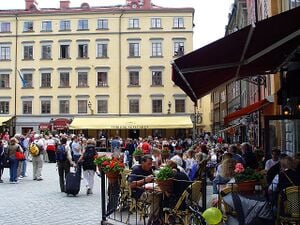
 Stockholm to ban petrol and diesel cars from centre from 2025, theguardian.com (Oct 11, 2023)
Stockholm to ban petrol and diesel cars from centre from 2025, theguardian.com (Oct 11, 2023)  Stockholm Thinks It Can Have an Electric Bikeshare Program So Cheap It’s Practically Free, vice.com (Oct 24, 2022)
Stockholm Thinks It Can Have an Electric Bikeshare Program So Cheap It’s Practically Free, vice.com (Oct 24, 2022)
Cycling activism[edit | edit source]
Between April and October, during the warmer months, it is possible to rent Stockholm City Bikes by purchasing a bike card online or through retailers. Cards allow users to rent bikes from any Stockholm City Bikes stand spread across the city and return them in any stand. There are two types of cards: the Season Card (valid from 1 April to 31 October) and the 3-day card. When their validity runs out they can be reactivated and are therefore reusable. Bikes can be used for up to three hours per loan and can be rented from Monday to Sunday from 6 am to 10 pm. These bikes have unfortunately not been a huge success because of people throwing them into the water or destroying them. Although the city bikes are not the only victims of this, e-scooters get similar treatment.
Urban sustainability[edit | edit source]
Research[edit | edit source]
- Stockholm Resilience Centre, international research centre on resilience and sustainability science, added 14:31, 26 February 2021 (UTC)
Green city with a national urban park[edit | edit source]
Stockholm is one of the cleanest capitals in the world. The city was granted the 2010 European Green Capital Award by the EU Commission; this was Europe's first "green capital". Applicant cities were evaluated in several ways: climate change, local transport, public green areas, air quality, noise, waste, water consumption, waste water treatment, sustainable utilisation of land, biodiversity and environmental management. Out of 35 participant cities, eight finalists were chosen: Stockholm, Amsterdam, Bristol, Copenhagen, Freiburg, Hamburg, Münster, and Oslo. Some of the reasons why Stockholm won the 2010 European Green Capital Award were: its integrated administrative system, which ensures that environmental aspects are considered in budgets, operational planning, reporting, and monitoring; its cut in carbon dioxide emissions by 25% per capita in ten years; and its decision towards being fossil fuel free by 2050. Stockholm has long demonstrated concern for the environment. The city's environmental program is the fifth since the first one was established in the mid-1970s. In 2011, Stockholm passed the title of European Green Capital to Hamburg, Germany.
Role model[edit | edit source]
At the beginning of 2010, Stockholm launched the program Professional Study Visits in order to share the city's green best practices. The program provides visitors with the opportunity to learn how to address issues such as waste management, urban planning, carbon dioxide emissions, and sustainable and efficient transportation system, among others.
According to the European Cities Monitor 2010, Stockholm is the best city in terms of freedom from pollution. Surrounded by 219 nature reserves, Stockholm has around 1,000 green spaces, which corresponds to 30% of the city's area. Founded in 1995, the Royal National City Park is the world's first legally protected "national urban park". For a description of the formation process, value assets and implementation of the legal protection of The Royal National Urban Park, see Schantz 2006 The water in Stockholm is so clean that people can dive and fish in the centre of the city. The waters of downtown Stockholm serve as spawning grounds for multiple fish species including trout and salmon, though human intervention is needed to keep populations up. Regarding CO2 emissions, the government's target is that Stockholm will be CO2 free before 2050.
About Stockholm[edit | edit source]
Stockholm (Swedish: [ˈstɔ̂kː(h)ɔlm] ) is the capital and most populous city of Sweden as well as the largest urban area in the Nordic countries. Approximately 1 million people live in the municipality, with 1.6 million in the urban area, and 2.4 million in the metropolitan area. The city stretches across fourteen islands where Lake Mälaren flows into the Baltic Sea. Outside the city to the east, and along the coast, is the island chain of the Stockholm archipelago. The area has been settled since the Stone Age, in the 6th millennium BC, and was founded as a city in 1252 by Swedish statesman Birger Jarl. The city serves as the county seat of Stockholm County.
